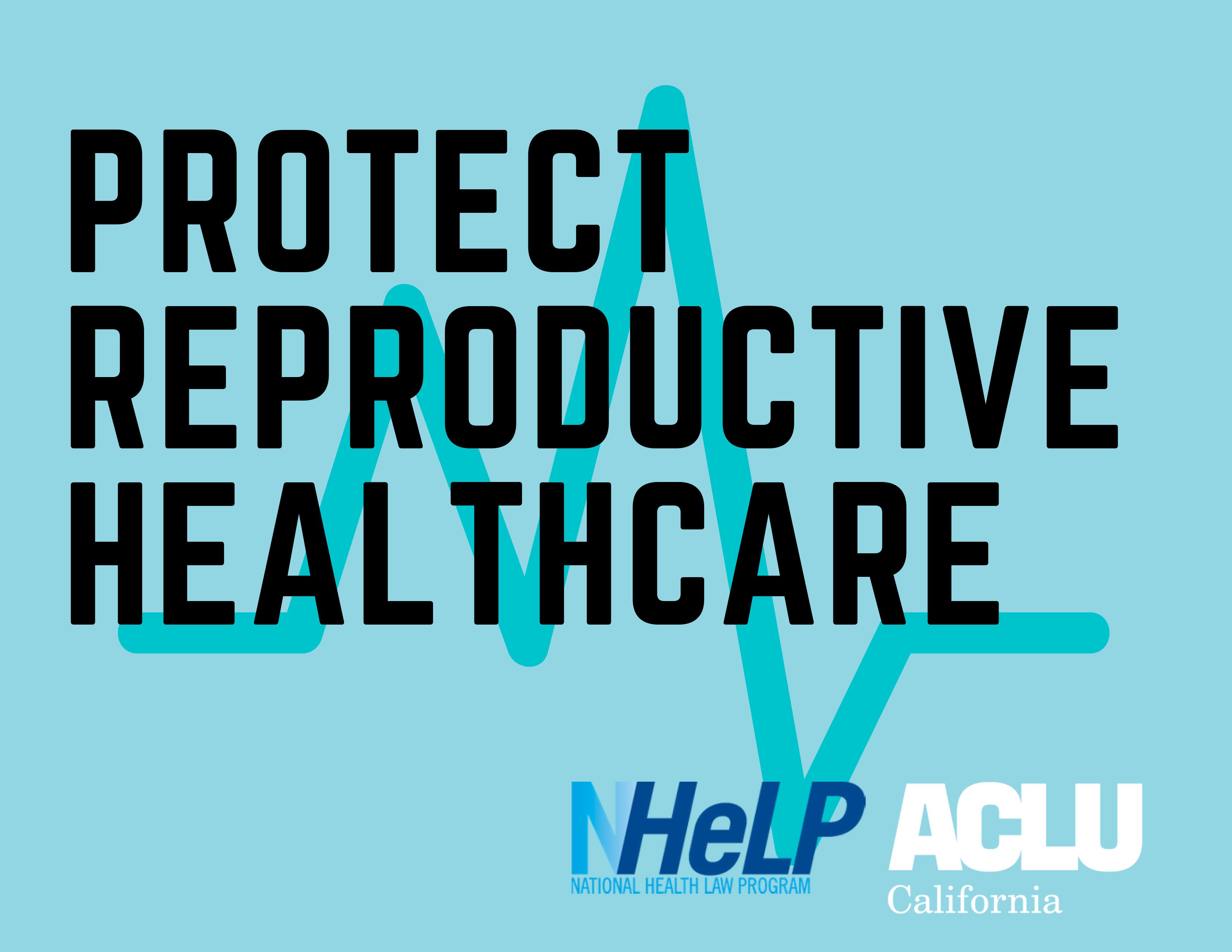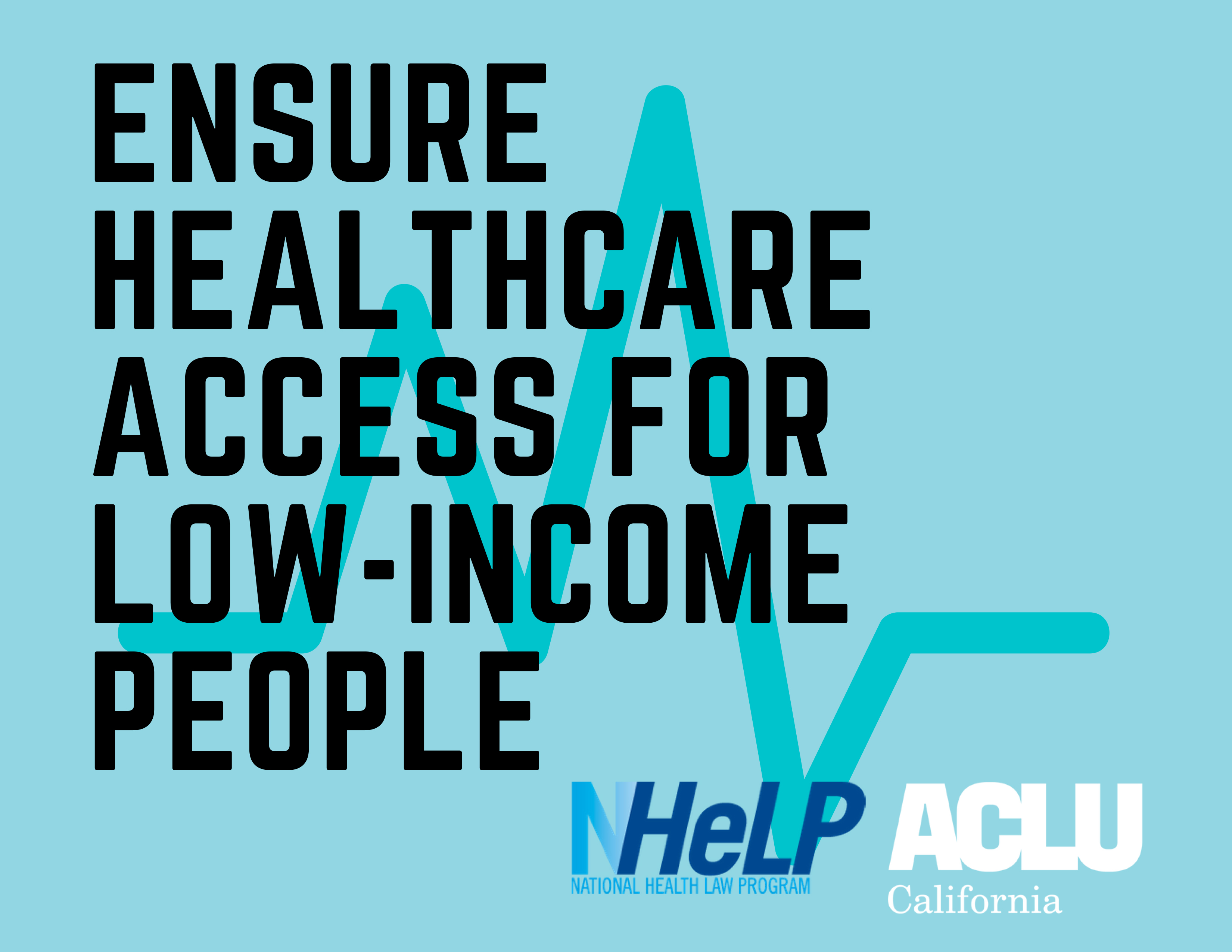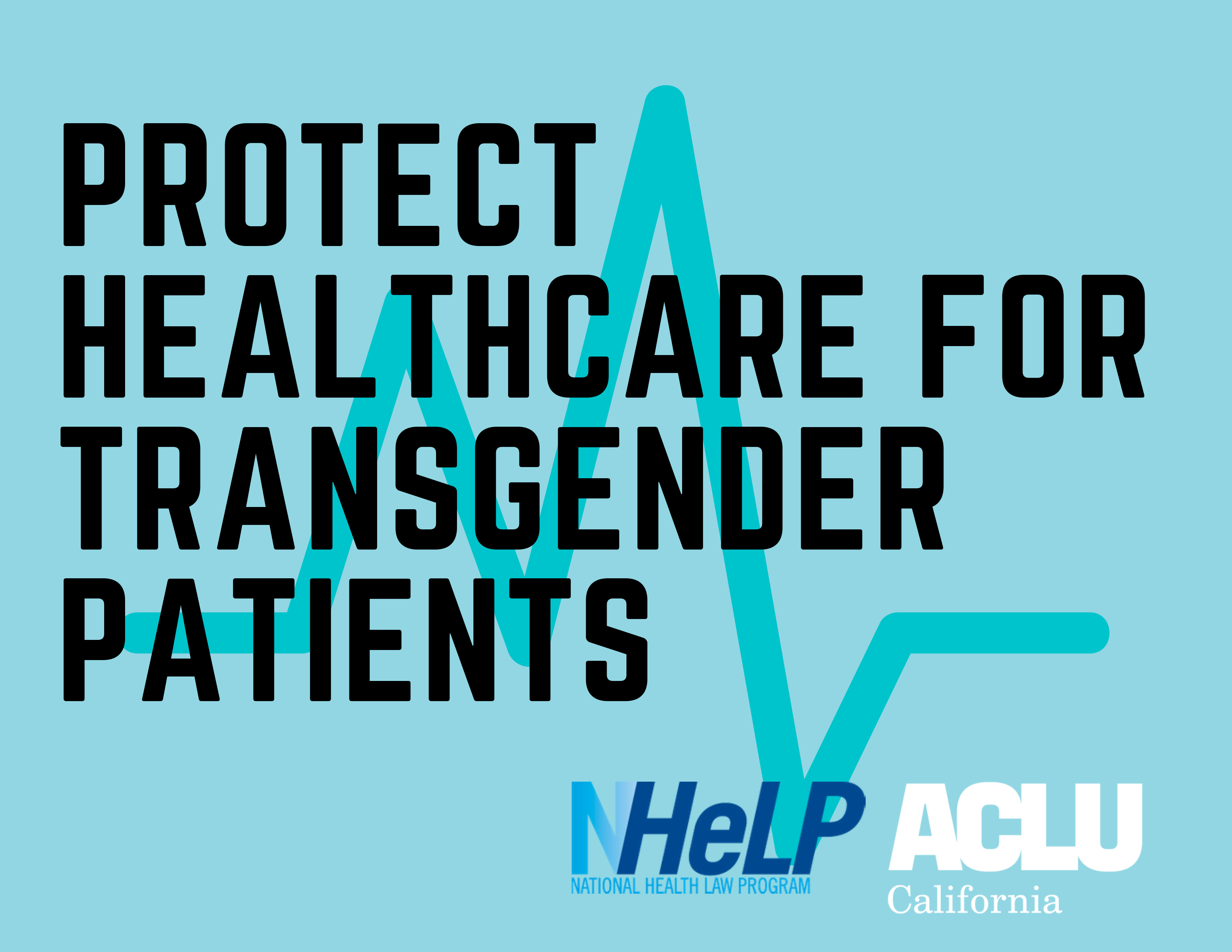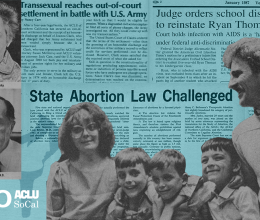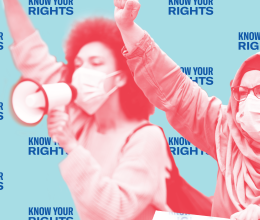
Dignity Health and Catholic Health Initiatives intend to merge, creating a mega Catholic health system that would be among the largest health systems in the nation. The ACLU has sued Dignity Health twice in California — over denial of reproductive health services and health care for transgender patients. This proposed merger, affecting Dignity Health hospitals across California, could further restrict access to essential health care.
At an upcoming hearing in your community, the California attorney general will be seeking public input on this proposed merger. We urge you to attend the meeting and make a brief comment about the impact this merger could have on reproductive health services, services for transgender patients, and services for low-income patients.
There will be meetings across the state, throughout September and possibly into October, in counties that contain a Dignity Health hospital: Calaveras, Kern, Los Angeles, Merced, Nevada, Sacramento, San Bernardino, San Francisco, San Joaquin, San Luis Obispo, San Mateo, Santa Barbara, Santa Cruz, Shasta, Siskiyou, Tehama, Ventura, and Yolo.
If you are planning to attend the public meeting in one of these other counties, please email Karen Camacho at kcamacho@aclunc.org with your name, organizational affiliation if any, email address and/or phone number, and public meeting(s) that you are interested in attending.
We will circle back with you when we have more information about your county. You can also check People Power's website to find a hearing near you and watch our Dignity Health and Catholic Health Initiatives Merger Rapid Response Webinar on YouTube. If you do decide to attend a hearing, print out a sign to take with you:
Resources
Guide to Providing Public Comments: Dignity Health/Catholic Health Initiatives Proposed Merger
Good morning. Thank you for the opportunity to provide input to the Attorney General on this transaction.
[Introduce yourself; introduce your organization if you represent one]
[State your personal interest in this transaction: (e.g. this hospital serves my community, I have been coming to this hospital for X years, I am a nurse/ physician at this hospital.)]
I am speaking today because I am concerned about the impact the proposed merger will have on: [choose one or more that move you to speak today]
- reproductive health services;
- health services for LGBTQ patients, and transgender patients in particular; and
- services for low-income communities, including uninsured patients, patients on Medi-Cal or Medicare, and the hospitals' charity care and community benefit services.
[See appendix that corresponds to your concern; choose points that speak to you.]
[Request(s) [selection based on focus-area(s) of your comments]:
- In their notice to the Attorney General, Dignity Health and Catholic Healthcare Initiatives committed to continuing to provide women's health services for a five-year period. We believe that this commitment is insufficient and request that the Attorney General require Dignity Health hospitals to maintain their provision of women's health services for at least ten years. This is particularly necessary in rural areas, where Dignity Health hospitals may be the only large acute-care hospital in the area that provides certain services. In these cases, patients may have no other feasible options for seeking care. [If in a rural area, mention that the specific hospitals in the county are some of the only ones available.] Timely and adequate access to care is crucial, and this is particularly the case for reproductive services.
- Due to the negative impacts that the ERDs have on women's health care, we ask the Attorney General to require the Dignity Health hospitals to expand their health services to include a full range of reproductive health services — including those prohibited by the ERDs. If this is not possible, we ask that the Attorney General require this expansion of reproductive health services at Dignity Health's non-Catholic hospitals.
All Dignity Health patients should have equal access to reproductive health services and gender-affirming health services, regardless of the facility that they go to. I urge the Attorney General to ensure that all reproductive health services and gender-affirming services that are currently being provided at each Dignity Health facility, including those being provided as exceptions to the ERD restrictions, be maintained. Where these services are being provided on a case by case basis, specific protocols must be in place and enforced to ensure they are available to all patients of those facilities. - At a minimum, we ask the Attorney General to require that Dignity Health not diminish or eliminate any of the reproductive health services or gender-affirming health services currently being provided at their facilities, and to commit to this requirement for at least ten years. We further ask the Attorney General to ensure that Dignity Health's non-Catholic hospitals be able to maintain their current provisions of reproductive health services and gender-affirming health services without facing separation or other negative consequences for doing so.
- Finally, I urge the Attorney General to require each Dignity Health hospital to submit a report one year after the merger, and three years after the merger, to confirm the level of reproductive, transition-related/ gender-affirming services, emergency care, community benefits, and charity care services that are being provided. Such reports will allow both the AG and advocates to ensure that Dignity Health is fulfilling its commitment to maintaining their current level of services.
[Optional] Closing statements:
- Every patient who enters a hospital, clinic, doctor's office, or any other medical setting expects to receive treatment that meets the standard of care. The ERD restrictions in place at Dignity Health's Catholic facilities are severe restrictions that violate straightforward evidence-based standards of care — which are accepted medical practice, adopted by the major professional medical associations.
- Dignity Health receives massive amounts of public funds to serve and provide health services to the general public. The Attorney General should require this institution to refrain from imposing non-medical restrictions on care and interfering in the patient-provider relationship.
Thank you.
Appendix 1: Reproductive Health Services
- This is a merger between two Catholic hospital systems. Catholic hospitals generally follow the Ethical and Religious Directives for Catholic Healthcare Services (ERDs). The ERDs prohibit many critical reproductive health services, including contraception, abortion, and some infertility treatments. The ERDs make no exceptions for risks to the patient's health or even life.
- In the case of ectopic pregnancies, where the fertilized egg is not implanted in the uterus, but remains in the fallopian tube, the ERDs call on medical providers to extract the embryo by taking out a portion of, or the entire fallopian tube, a procedure that severely decreases a woman's future fertility. This is done in spite of the fact that the standard of care for ectopic pregnancies is to inject the drug methotrexate or to remove the embryo surgically while leaving the fallopian tube intact, both of which are intended to preserve fertility. The Catholic logic is that a direct attack on the embryo, through the latter two procedures, is impermissible, while an indirect approach, through removing the fallopian tube, is morally acceptable.
- Adherence to the ERDs mean that Catholic hospital employees may be prohibited from performing certain procedures, even if their inaction could result in the patient's death. For example, a Catholic hospital outside of Chicago refused to end the pregnancy of a woman whose water broke well before the fetus was viable. By the time she was transferred to a non-Catholic hospital, she had a fever of 106 degrees and was close to death from sepsis. The delay in ending the pregnancy resulted in the patient suffering an acute kidney injury requiring dialysis and a cognitive injury due to the severity of the sepsis.
- The ERDs restrict the information health professionals may give to patients, interfering with patient autonomy and the provider-patient relationship. The directives require the patients receive "reasonable information" about the care including, "risks, side-effects, consequences and cost; and any reasonable and morally legitimate alternatives, including no treatment at all." Unfortunately, by limiting the disclosure of alternative treatments to ones that the Catholic Church deems "morally legitimate," providers can be prohibited from informing patients about alternatives that may be the most medically suitable and safe for them.
- A Catholic hospital in Michigan sent a pregnant woman, whose water broke at 18 weeks, home with two Tylenol without telling her that there was virtually no way she could give birth to a healthy baby. Ending the pregnancy would have been the safest course of action for her, but the ERDs forbade the disclosure of this information. The woman returned to the hospital twice more, each time in excruciating pain and bleeding, with signs of infection. On the third instance, the hospital began filling out her discharge paperwork and only provided care when she began to deliver the baby. This policy of only disclosing "morally legitimate" information, violates established principles of informed consent and prevents patients in hospitals governed by ERDs from choosing treatment options that are the medical standard of care.
- The ERDs require decision-makers to consider the possibility of "scandal," which the Church defines as an attitude or behavior that leads another to do evil. Under this standard, patients denied services, such as abortions or sterilizations, at a Catholic hospital would also be denied referrals to institutions that do provide the services, since providing these referrals would create "scandal."
- The denial of reproductive health services in accordance with the ERDs has resulted in serious pain, suffering, loss of dignity, deviations from best medical practices, and even death. Patients have been turned away for miscarriage treatment while bleeding and actively miscarrying. Other patients are denied tubal ligation surgeries right after giving birth, which is the safest time for the procedure, and forced to seek a second surgery elsewhere. Additionally, transgender patients have had gender-affirming surgeries denied on religious grounds.
Appendix 2: LGBTQ patients
- Adherence to the Ethical and Religious Directives for Catholic Healthcare Service (ERDs) increases the likelihood that LGBTQ individuals and their families will face discrimination in seeking to access health care services consistent with their medical needs.
- Though the ERDs do not discuss transgender and gender non-conforming patients directly, we know that these patients have faced barriers in Dignity Health facilities throughout the state when trying to access gender-affirming care. (Gender-affirming, or transition-related, care refers to health care a trans or gender non-conforming person may need to address gender dysphoria and develop a gender expression to match their gender identity.)
- In California and elsewhere, Dignity Health and other Catholic hospitals have deemed medically necessary, life-saving gender affirming care (such as a hysterectomy) to be "direct sterilization" and thus impermissible under the ERD restrictions. For example, in one case in California, Dignity Health thwarted a transgender man from getting his hysterectomy the day before it was scheduled, upon learning that he was transgender.
- Denials of health care for transgender patients do not happen in a vacuum. Transgender patients already face difficulties at various stages of accessing health care. For example, trans patients may face difficulty securing insurance coverage for medically necessary care, experience anti-trans discrimination or mistreatment within the health care system, and/ or struggle to pay for the care they need. In that context, discrimination at the final step of accessing care is particularly unjust.
- High rates of poverty in the transgender community make it even more important that transgender patients can access the transition-related care they need in their own communities. According to the 2015 U.S. Transgender Survey (the largest survey examining the experiences of transgender people in the US), 33% of transgender people surveyed in California lived in poverty, compared to 12% in the U.S. population.
- All patients deserve to be treated with dignity and respect. Dignity Health and Catholic Health Initiatives should be required to provide assurances that LGBTQ patients will be treated with the same dignity and respect, and will receive the same medical standard of care, as any other patient.
Appendix 3: Medi-Cal/Medicare, Charity Care
- Dignity Health is the state's largest provider of Medi-Cal services and is a critical part of the state's social safety net. DH and CHI's commitment to maintain the current level of Medi-Cal and Medicare participation for five years does not offer sufficient protection of low-income and elderly individuals. Their commitment does nothing to protect against decreasing participation after five years, nor does it account for the growing numbers of Medi-Cal and Medicare recipients.
- [For rural and/or low-income areas especially]
In [YOUR COUNTY], the Dignity Health hospital(s) serve a large low-income population. [Describe the Medicare and Medi-Cal participation numbers/percentages in the specific county, with the specific hospitals.] - We ask the Attorney General to require the parties to maintain their current levels of Medi-Cal and Medicare participation for a minimum of ten years, to ensure that low-income and elderly individuals are not left without necessary medical care.
- Dignity Health and CHI's five-year commitment to maintaining the current emergency department designations and licensed specialty bed designations is insufficient to protect the populations that their hospitals serve and does nothing to protect against eliminating any currently offered health services after the five-year term ends. We urge the Attorney General to require Dignity Health to make this commitment for a minimum of ten years.
- Charity care provides an essential safety net for struggling individuals and families who would otherwise forgo needed care or be locked in poverty due to medical debt from hospital visits. Nearly three million Californians are still uninsured, and many insured Californians still face affordability concerns for medical care. Thus, charity care programs continue to be a needed and valued part of the safety net.
- Many Dignity Health hospitals serve large low-income populations. The charity care and community benefits provided by Dignity Health hospitals are substantial. Dignity Health's California hospitals annually contribute more than $71 million in charity care and $135 million in community benefits. Any reduction in this care would have a serious deleterious effect on low-income community members. Dignity Health and CHI's commitment to maintain the current level of Medi-Cal and Medicare participation and charity care and community benefit contributions for six years does not offer sufficient protection.
- In some counties, particularly in rural areas, Dignity Health hospitals may be the only hospital in the area that provide a particular service. Low-income patients may have no other reasonable option to receive medical care and may require charity care to avoid medical debt and bankruptcy. We ask the Attorney General to require the parties to maintain an annual amount of Charity Care and Community Benefit Services no less than what the health impact statement has identified as necessary to maintain current levels, for a minimum of ten years, to ensure that low-income individuals are not left without necessary medical care. Further, the annual rate of increase for these amounts should be tied to the inflation rate as determined by the Consumer Price Index for [YOUR COUNTY], California.
- Apart from the amount of money spent on charity care and community benefits, the Attorney General should require these Dignity Health Hospitals to improve their processes for informing patients about charity care and financial assistance.
- All uninsured patients or patients with high medical costs who are at or below 350% of the federal poverty line are eligible to apply for a hospital's charity care or discount payment policy. Yet, many patients who are eligible for charity care do not know about the option. The Attorney General should require Dignity Health's hospitals to submit their policies and procedures for informing patients about their charity care and financial assistance programs. The hospitals should post information about these programs to their websites and signs should be placed prominently and in multiple languages in the emergency room. Further, every uninsured patient that leaves the emergency room should receive a charity care application. And in order to avoid deterring undocumented immigrants from seeking charity care, the application should say in bold letters that no social security number is required to qualify for charity care.
- Guide to Providing Public Comments
- FAQ - Dignity Health/Catholic Health Initiatives Proposed Merger
FAQ: Dignity Health/Catholic Health Initiatives Proposed Merger
Background
Dignity Health is a nonprofit Catholic hospital system with twenty-seven acute care hospitals in California. The hospitals and their respective counties are listed in the appendix at the end of this fact sheet. Dignity Health and Catholic Healthcare Initiatives (CHI) have given notice of an agreement to merge. Their announcement raises concerns about the future availability of reproductive health services and other critical services at their hospitals, as well as services for low-income communities.
What is the role of the Attorney General?
California law requires the Attorney General’s review and consent for any sale or transfer of a health care facility owned or operated by a nonprofit corporation. The review process includes a public meeting in every county affected by the transaction. The Attorney General’s consent is often conditional on the continuation of existing levels of charity care, emergency services, and other essential health services. However, the Attorney General can consider any other factors that they deem relevant.
What are the Ethical and Religious Directives (ERDs) and how do they impact reproductive health?
The Dignity Health-CHI merger is between two Catholic hospital systems. Catholic hospitals adhere to the Ethical and Religious Directives for Catholic Healthcare Services (ERDs) promulgated by the United States Conference of Catholic Bishops. The ERDs prohibit many critical reproductive health services including abortion, contraception, and some infertility treatments, making no exceptions for risks to the patient’s health or life.
The ERDs also limit the information that providers may give to patients to options that are “morally legitimate.” For example, a Catholic hospital in Michigan gave a woman whose water broke at eighteen weeks two Tylenol instead of informing her that the safest course of action would be to end the pregnancy, which is not a “morally legitimate” option. The ERDs also prohibit providers from referring patients denied services at a Catholic hospital to hospitals that do provide the services.
How are the ERDs implemented in Catholic hospitals such as Dignity?
Implementation of the ERDs can vary greatly from hospital to hospital. Some hospitals follow the ERDs strictly, while others pick and choose which patients get exceptions from the ERDs. Some Dignity Health hospitals are also “non-Catholic” (see appendix). These hospitals are not required to follow the ERDs, so they may be able to provide contraception and sterilizations. Yet, even non-Catholic hospitals may be prohibited from performing abortions or in vitro fertilizations.
Non-Catholic hospitals, including those operated by Dignity Health, may face more restrictions in the future. Recently, the U.S. Conference of Catholic Bishops released the sixth edition of the ERDs, strengthening the language in a section on collaborations in health care. The revised directives’ bottom line is that, “In any kind of collaboration, whatever comes under the control of the Catholic institution—whether by acquisition, governance, or management—must be operated in full accord with the moral teaching of the Catholic Church, including these Directives.”
With the revised ERDs, the provision of contraceptives, sterilizations, and other reproductive health services in Dignity Health’s non-Catholic hospitals may be at risk. The directives give bishops the “ultimate responsibility” to determine whether health care collaborations involve “scandal” or “wrongful cooperation” in medical care that violates Catholic principles. In the future, non-Catholic hospitals may be forced to adhere fully to the ERDs, or they may be separated from Catholic hospital systems, potentially threatening their survival and threatening the provision of necessary health services to the communities they serve.
One in six hospital beds in the United States is in a Catholic hospital. Patients have been turned away for treatment while actively miscarrying. Other patients are denied tubal ligation surgeries, and transgender patients have been denied gender-affirming surgeries. Catholic hospitals, which receive billions in taxpayer dollars, are turning away patients seeking emergency care, failing to provide critical reproductive health services, and placing their religious beliefs ahead of women’s health and lives.
What do we know about Dignity Health and reproductive health services?
Dignity Health has been sued for its denials of reproductive health services in California. In April 2016, the ACLU and the California Medical Association filed suit against Dignity Health for denying a patient a tubal ligation, arguing that withholding pregnancy-related care for reasons other than medical considerations is illegal in California. The hospital, Mercy Medical Center in Redding, has denied at least three women tubal ligations. The case is currently in discovery on the claim that Dignity Health is engaging in an unlawful business practice. In April 2017, the ACLU again sued Dignity Health for denying a patient a hysterectomy for his gender transition. The suit alleges that withholding medical care on the basis of a patient’s gender identity is sex discrimination in violation of California’s Unruh Civil Rights Act.
What are some of the other services at stake?
Access to Emergency and Other Critical Services
Apart from access to reproductive services, Dignity Health hospitals are also a significant provider of emergency care and other critical services. In rural areas with few acute care hospitals, Dignity Health’s hospitals are crucial to ensuring that people in those communities can access necessary care easily.
Equal Access to Medical Care; Anti-Discrimination
Catholic hospitals’ adherence to the ERDs increases the likelihood that LGBTQ+ individuals will face discrimination in accessing health care services consistent with their medical needs. Catholic hospitals already do not perform hysterectomies for the purposes of gender reassignment. With the new Administration signaling that it would allow for more religious refusals in health care, it may be possible that more providers will discriminate when deciding who will receive care.
Access for Low-Income Communities through Medi-Cal
Dignity Health is the state’s largest provider of Medi-Cal services. Not all doctors will accept patients covered by Medi-Cal because the program reimburses providers at a lower rate than other payers. As Medi-Cal has seen an increase of over 5.6 million enrollees since 2013 due to Medicaid expansion, it is critical that Dignity Health will continue to maintain or increase its current levels of Medi-Cal participation.
Access for Low-Income Communities through Charity Care
Nearly 3 million Californians are still uninsured, and many insured Californians still face affordability concerns for medical care. All uninsured patients or patients with high medical costs who are at or below 350% of the federal poverty line are eligible to apply for a hospital’s charity care or discount payment policy. Nonprofit hospitals like those owned by Dignity Health are required to provide a certain level of charity care and community benefit services each year. Community benefit services include charity care, along with other programs that improve access to health care services, enhance community health, or advance health knowledge. Dignity Health’s California hospitals annually contribute more than $71 million in charity care and $135 million in community benefits, and they should be required to maintain or increase their contributions.
What could we ask the Attorney General to do?
Expand or Maintain Reproductive Health Services
As California’s nonprofit hospital transactions must be approved by the Attorney General, there exists an opportunity for the public to express their opinions about Catholic hospitals’ neglect of reproductive rights. Ideally, the Attorney General would require all Dignity Health hospitals in California to expand their women’s health services to include those prohibited by the ERDs. This is unlikely to happen, but more plausible requirements might be 1) for Dignity Health’s non-Catholic hospitals to expand their women’s health services, or 2) that Dignity Health commit to not diminishing or eliminating any currently-offered reproductive health services for a long period of time.
Expand or Maintain Access to Emergency Care and Other Critical Services
The hospitals involved in the merger, especially the ones located in rural areas, should maintain their current offerings of critical care services for as long as possible after the merger takes place. Without this promise, there remains a possibility that rural communities would lack access to important health care services.
Ensure Equal Access to Medical Care
Dignity Health and CHI should be required to provide assurances that patients, including LGBTQ+ patients, will be treated with dignity and respect, and will receive the same medical standard of care as any other patient.
Expand or Maintain Medi-Cal and Participation Levels
Dignity Health and CHI have pledged to maintain their current levels of participation for only five years after the merger. As Dignity Health hospitals may be the only acute care hospital in an area, patients with Medi-Cal coverage may have no other option if they cannot access care at a Dignity Health hospital. Thus, the Attorney General should require the hospitals to maintain Medi-Cal service levels for a longer period of time.
Expand or Maintain Charity Care and Community Benefit Service Levels
Many patients who are eligible for charity care do not know about the option. As a condition to consent for the merger, the Attorney General could require Dignity Health’s hospitals to improve its policies for informing patients about their charity care programs. The hospitals should post information about these programs to their websites, place signs prominently and in multiple languages in hospitals, offer every uninsured patient a charity care application, and amend the application to say in bold letters that no social security number is required to qualify for charity care.
The Attorney General may consider increasing the amount of charity care and community service benefits that Dignity Health hospitals will be required to provide in the future. Dignity Health and CHI are willing to maintain their current levels of charity care and community benefit services for six years after the merger. As health care costs continue to rise, uninsured people may face larger burdens in paying for medical care, and it may be necessary for hospitals like Dignity Health’s to offer more charity care.
Appendix: List of Dignity Health CA Hospitals and Counties
Calaveras County:
Mark Twain Medical Center: 768 Mountain Ranch Rd., San Andreas, CA 95249Kern County:
Memorial Hospital - Bakersfield: 420 34th Street, Bakersfield, CA 93301
Mercy Hospital Downtown: 2215 Truxtun Avenue, Bakersfield, CA 93301
Mercy Hospital Southwest: 400 Old River Road, Bakersfield, CA 93311Los Angeles County:
California Hospital Medical Center: 1401 S. Grand Avenue, Los Angeles, CA 90015
Glendale Memorial Hospital and Health Center: 1420 S. Central Avenue, Glendale, CA 91204
Northridge Hospital Medical Center: 18300 Roscoe Blvd., Northridge, CA 91328
St. Mary Medical Center Long Beach: 1050 Linden Avenue, Long Beach, CA 90813Merced County:
Mercy Medical Center Merced: 333 Mercy Avenue, Merced, CA 95340Nevada County:
Sierra Nevada Memorial Hospital: 155 Glasson Way, Grass Valley, CA 95945Sacramento County:
Mercy General Hospital: 4001 J Street, Sacramento, CA 95819
Mercy Hospital of Folsom: 1650 Creekside Drive, Folsom, CA 95630
Mercy San Juan Medical Center: 6501 Coyle Avenue, Carmichael, CA 95608
Methodist Hospital of Sacramento: 7500 Hospital Avenue, Sacramento, CA 95823San Bernardino County:
Community Hospital of San Bernardino: 1805 Medical Center Drive, San Bernardino, CA 92411
St. Bernardine Medical Center: 2101 N. Waterman Avenue, San Bernardino, CA 92404San Francisco County:
Saint Francis Memorial Hospital: 900 Hyde Street, San Francisco, CA 94109
St. Mary’s Medical Center: 450 Stanyan Street, San Francisco, CA 94117San Joaquin County:
St. Joseph’s Behavioral Health Center: 2510 N. California Street, Stockton, CA 95204
St. Joseph’s Medical Center: 1800 N. California Street, Stockton, CA 95204San Luis Obispo County:
Marian Regional Medical Center, Arroyo Grande Campus (fka Arroyo Grande Community Hospital): 345 S. Halcyon Road, Arroyo Grande, CA 93420
French Hospital Medical Center: 1911 Johnson Avenue, San Luis Obispo, CA 93401San Mateo County:
Sequoia Hospital: 170 Alameda de las Pulgas, Redwood City, CA 94062Santa Barbara County:
Marian Regional Medical Center: 1400 E. Church Street, Santa Maria, CA 93454
Marian Regional Medical Center West: 505 E. Plaza Drive, Santa Maria, CA 93454Santa Cruz County:
Dominican Hospital: 1555 Soquel Drive, Santa Cruz, CA 95065Shasta County:
Mercy Medical Center - Redding: 2175 Rosaline Avenue, Redding, CA 96001Siskiyou County:
Mercy Medical Center - Mt. Shasta: 914 Pine Street, Mt. Shasta, CA 96067Tehama County:
St. Elizabeth Community Hospital: 2550 Sister Mary Columbia Drive, Red Bluff, CA 96080Ventura County:
St. John’s Pleasant Valley Hospital: 2309 Antonio Avenue, Camarillo, CA 93010
St. John’s Regional Medical Center: 1600 Rose Avenue, Oxnard, CA 93030Yolo County:
Woodland Memorial Hospital: 1325 Cottonwood Street, Woodland, CA 95695
